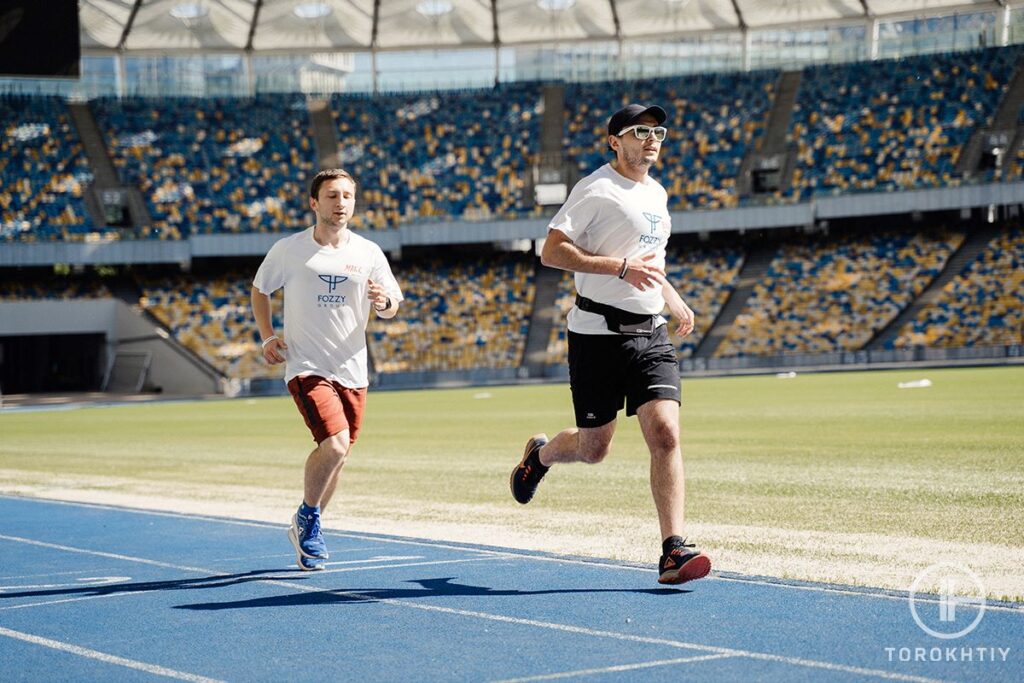3 Day A Week Half Marathon Training Plan: Prepare For Run
Author:
Reviewed by:
(Head of Sport Science, 20 years of Oly Lifting experience, PhD Sport Science)
Unlock your full potential by engaging with our experts and community! Have questions about your fitness journey or looking for expert advice on weightlifting techniques? Don’t hesitate — leave a comment below and Oleksandr Zagrebelnyi will provide a personalized answer and insights to help you reach your goals.
Torokhtiy is reader-supported. Some links are affiliate links, and we may earn a commission at no extra cost to you. See our disclosure page for details.
Looking to tick off a half marathon from your blacklist? Well, here’s what you need to achieve this goal: 3-day-a-week half marathon training is a great place to start.
Training consistently for 3 days over several weeks will prepare you for the demands of a half marathon. In this article, we will equip you with what you need to know to prepare for a half marathon and a tremendous 3-day running program to help prepare you. Let’s dive in!
Is It Enough To Train 3 Days A Week To Prepare For A Half Marathon? — 8-16 weeks offers sufficient time to prepare for a half marathon. Exercises like long runs, interval and tempo runs should fill your 3-day running program, and add progress overload to help increase your overall fitness.

Running 3 Days A Week: How To Prepare For Half-Marathon?
Given the seemingly demanding nature of the race, the idea of running just three days a week to prepare for a half-marathon may raise people’s eyebrows. However, this approach can be efficient if done correctly and diligently, particularly for those with limited time availability or who are new to the world of half marathons.
The half-marathon distance, approximately 21.1 kilometers (13.1 miles), typically takes an average finish time of about 2 to 2.5 hours, at a moderate pace of 8 km/h. While training only three days per week might seem unconventional, careful planning can yield positive results.
As you prepare for a half marathon, the key is to build up enough mileage to get your body accustomed to the required running. You have to check your current ability to gauge how much you should be running and how far your goals should be weekly.
Here’s a starting point for you: If you can run 5 km, you should be able to run a half marathon within two months with proper training. However, if you cannot run 5 km now, you must start training a little earlier and create a suitable 3-day-a-week half marathon training schedule to help you achieve your goals.
Another way to gauge your running ability is by measuring your Maximum Aerobic Speed (MAS) and Maximum Heart Rate. You can calculate your MAS with various methods; the Half-Cooper Test stands out as a great choice. In the Half-Cooper Test, you must run as far as possible on a flat running trail or course within six minutes.
To calculate your MAS, simply divide the distance you covered by 100. For example:
If you run 1 km in six minutes, your MAS will be 10 km/h. This should give you an idea of what you need to train for. During a half marathon, you’ll generally need to maintain a pace of 70% to 85% of your MAS (7–8.5 km/h).
Likewise, most half-marathon runners run within 60%–80% of their MHR during the race. You first need to work out your MHR to work this out for yourself. This can be done by subtracting your age from 220 and then calculating the corresponding percentage. Both your MAS and MHR are vital factors you can use to prepare for half-marathon training 3 days a week.
A 3-day running program is an excellent start to building your fitness level as you work toward these goals. If you are new to running, having breaks between running days can help your body recover for the next day. Now, let’s look at some pros and cons of a 3-day-a-week running plan for a half marathon.

Advantages:
Disadvantages:
3 Training Methods You Can Use In A 3-Day-A-Week Half-Marathon Training Plan
How you train for a half-marathon is vital. You must use your time wisely if you’re embarking on an 8-week half marathon training 3 days per week. Choosing suitable training methods is a part of this process. With that in mind, before you get into training, consider these factors to help you succeed:
- Take it slow: Whether you are a beginner or a well-seasoned runner, as you begin to train again, it’s essential to take it slow so your body can adapt to the demands placed on it well.
- The more time you have to train, the better: If you start training earlier than 8 weeks, you will have the time to slowly improve your overall fitness. Give yourself sufficient time to get into shape.
- Eat correctly: A healthy diet is the difference between success and failure for many runners. Eating healthy before a run or half marathon will give you the energy you need to achieve your goals.
- Purchase suitable running shoes: Trust us, choosing good running shoes makes a difference! Look for shoes that are comfortable, supportive, and lightweight.
- Choose the right running clothes: Make sure your running clothes are weather-appropriate and breathable. This might include a runner’s rain jacket or a sleeveless running vest.
- Plan wisely: Set weekly goals. If you have 8 weeks to prepare, you must fill your training program with valuable workouts to help you achieve your goals.
Now that you have a few things to consider before you plan your 3-day-a-week half marathon training schedule, let’s look at some workouts we use to train for half marathons.

1. Interval Runs (IR)
IRs involve combining high-intensity runs with periods of low-intensity recovery. Often linked with anaerobic training, interval training is known to improve fast-twitch muscle fibers.
This kind of training not only helps boost your top speed but also trains your body to handle and recover from intense running periods. This ability is crucial, especially if you’re aiming for a strong finish in a half marathon.
2. Long Runs (LR)
Long runs are beneficial for training for a half marathon. LRs progressively increase your endurance and mental health. Let’s be honest; we eventually hit a wall in the long run. LRs are where you can train yourself physically and mentally by progressively overloading yourself with every training session.
By gradually increasing the distance of your long runs week after week, you’re conditioning your body to handle the demands of the half marathon distance.
3. Tempo Runs (TR)
TRs require you to keep a comfortable yet challenging pace below your MAS and MHR. TR training increases your lactate threshold, which is when lactic acid builds up in the muscles, leading to fatigue. Increasing this threshold allows you to run faster for longer periods, which is invaluable for competing in half marathons.
Half Marathon Training Plan For 3 Days A Week
Ready to hit the road and train? Here’s a training schedule we suggest using. We will do an 8-week half marathon training 3 days per week for this schedule.
Note that each week, we are increasing the distance or difficulty of the exercise. This is called progressive overload. This is used to teach your body to adapt to the new demand required to perform and, in turn, increase your VO2 Max and lactate threshold.
Once you have gauged your ability, you can either start at 3 km or 5 km. Remember, starting slowly is important to avoid injury. These exercises are perfect for half-marathon training 3 days a week.
3-Day Training Plan For Beginners
| Week | Day 1 (Cross) | Day 2 (IR) | Day 3 (LR) |
|---|---|---|---|
| 1 | 3-5 km | 4×400 m | 4-6 km |
| 2 | 4-6 km | 4×500 m | 5-7 km |
| 3 | 5-7 km | 4×600 m | 6-8 km |
| 4 | 6-8 km | 6×600 m | 8-10 km |
| 5 | 8-10 km | 6×700 m | 10-12 km |
| 6 | 8-10 km | 7×700 m | 12-14 km |
| 7 | 10-12 km | 7×800 m | 14-16 km |
| 8 | 10-12 km | 8×800 m | 16-18 km |
3-Day Training Plan For Experienced Runners
| Week | Day 1 (TR) | Day 2 (IR) | Day 3 (LR) |
|---|---|---|---|
| 1 | 4 km | 8×400 m | 10 km |
| 2 | 4.5 km | 8×500 m | 12 km |
| 3 | 5 km | 7×600 m | 14 km |
| 4 | 6 km | 7×800 m | 16 km |
| 5 | 7 km | 4x1000m | 18 km |
| 6 | 8 km | 10x1200m | 20 km |
| 7 | 9 km | 11×1400 m | 21 km |
| 8 | 10 km | 12x 1600 m | 22 km |
Tips For Sticking To A 3-Day Per Week Half Marathon Training Schedule
Sticking to a 3-day per week half marathon training plan can be difficult, especially when you first begin. However, here are some tips to help you see it through:
Change It Up
Fatigue can also be a result of boredom. Keep your training sessions interesting. Run a different route, and listen to inspiring music. Try to achieve a new goal with each session. Keeping your training interesting is a great way to keep you driven as you train for that half marathon.
Allow Your Body To Recover
Nothing discourages training more than having a sore body. If you overdid it in one day, you must allow your body to recover well before you get back out there. Regulate your training intensity to allow your body to recover before your next session.

How Much Time To Train For A Half Marathon With A Three-Day A Week Plan?
The duration of your 3-day-a-week marathon training program will depend on your current fitness level. Generally, a 3-day per week half marathon training plan can span 8 to 16 weeks, or more. Remember, the more time you have to train, the more gradual your development will be.
For beginners, start as early as possible. A 16-week plan will give you sufficient time to ease into running and achieve your goals. If you require less, an 11- or 8-week plan should be adequate.
Hoka Bondi 8
- Material: Breathable and supportive mesh upper
- Sole Material: Full-length EVA midsole for maximum cushioning
- Outsole (tread feature): Durable rubber outsole with a unique lug pattern
- Drop: 4mm
- Season: Suitable for all seasons
- Special Features: Exceptional cushioning and comfort
- Size: Available in various sizes
- Type: Maximum cushioning running shoe
If you want excellent running or walking shoes or just footwear you’ll be comfortable in, you can’t go wrong with the Hoka Bondi 8.
It’s been upgraded and now they have lighter, softer materials and a new extended heel design. The heel design gives a super soft, balanced feeling from th emoment your heel hits the ground to when you push off with your toes.
As far as the weight goes, it’s around 10.80 ounces, and the heel drop is 4 mm. They’re not too heavy and the lower drop is a good balance between cushioning and feeling connected to the ground.

The Bondi 8 is focused on cushioning and keeps things simple. There’s a good amount of support without any extra stuff that you don’t really need and that would only jack up the price. Take the rear crash pad, for example – it makes for a soft, smooth ride, which is perfect if you like to run outdoors.
The upper part is made of engineered mesh, which is breathable and keeps your feet cool and dry. The tongue and collar have memory foam and mold to your foot shape. All of these features make the fit snug but flexible, which is exactly what you would want.
The Bondi 8 is eco-friendly because it uses recyclable materials in parts like the mesh and the sockliner. Plus, the shoes are completely vegan, which (if that’s important to you) is nice!
FAQ
Is Running 3 Days A Week Enough For A Half Marathon?
Running three days a week can provide you with ample marathon prep if you train wisely. Combining various training methods and training consistently should help you achieve your goals.
How Much Weight Will I Lose Running 3 Times A Week?
Weight loss from running three times a week varies depending on the distance you run, the tempo at which you run, and your diet. On average, experts say that runners burn up to 3600 calories on an 8-mile run.
Conclusion
3-day-a-week half marathon training is a proactive way of preparing for a half marathon. While its result might not be as fast as other rigorous training programs, using a 3-day running program over several weeks is more than sufficient to get your body to the point where it can handle the demands of a half marathon.
Using exercises like long runs, tempo runs, and interval running in this program should help you prepare. If you have experience with half marathon training 3 days a week, we would love to hear from you. Feel free to share your experiences with us in the comments section below.
Also read:
References:
- The Fitness Zone // Australian Institute of Fitness: https://fitness.edu.au/the-fitness-zone/training-at-maximum-aerobic-speed/
- Target Heart Rates Chart // American Heart Association: https://www.heart.org/en/healthy-living/fitness/fitness-basics/target-heart-rates
- Target heart rate for exercise // University of Iowa Health Care: https://uihc.org/health-topics/target-heart-rate-exercise
- Nutrition and athletic performance // MedlinePlus: https://medlineplus.gov/ency/article/002458.htm
- Choosing the Right Running Shoe // UCSF Health: https://www.ucsfhealth.org/education/choosing-the-right-running-shoe
- Photos are made by Torokhtiy Media Team, RUN 4 FFWPU Pexels
Why Trust Us?
With over 20 years in Olympic weightlifting, strength training, nutrition coaching, and general fitness our team does its best to provide the audience with ultimate support and meet the needs and requirements of advanced athletes and professional lifters, as well as people who strive to open new opportunities and develop their physical capabilities with us.
By trusting the recommendations of our certified experts in coaching, nutrition, and sports training programming, as well as scientific consultants, and physiotherapists, we provide you with thorough, well-considered, and scientifically proven content. All the information given in the articles concerning workout programming, separate exercises, and athletic performance, in general, is based on verified data.
The product testing process is described in more detail here.
Oleksandr is a running coach and member of the Nike Run Club coaching team for 8 years. A participant in national and international competitions at distances from one kilometer to the ultra trail. Owner of mountain trail running camps. Nowadays Oleksandr is responsible for creating running training programs for athletes of various levels, coaching personally offline and online, conducts trail running camps in the mountains, participates in competitions.
Reviewed by: Sergii Putsov
Head of Sport Science, PhD
Best Results: Snatch – 165 kg,
C&J – 200 kg
Sergii Putsov, Ph.D., is a former professional weightlifter and National team member, achieving multiple medals in the 94 kg weight category at national competitions. With a Master’s degree in “Olympic & Professional Sport Training” and a Sport Science Ph.D. from the International Olympic Academy, Greece, Sergii now leads as the Head of Sport Science. He specializes in designing training programs, writing insightful blog articles, providing live commentary at international weightlifting events, and conducting educational seminars worldwide alongside Olympic weightlifting expert Oleksiy Torokhtiy.





Still have questions after reading our article? Unlock your full potential by engaging with our experts and community! Don’t hesitate — leave a comment below and Oleksandr Zagrebelnyi will provide a personalized answer and insights to help you reach your goals.